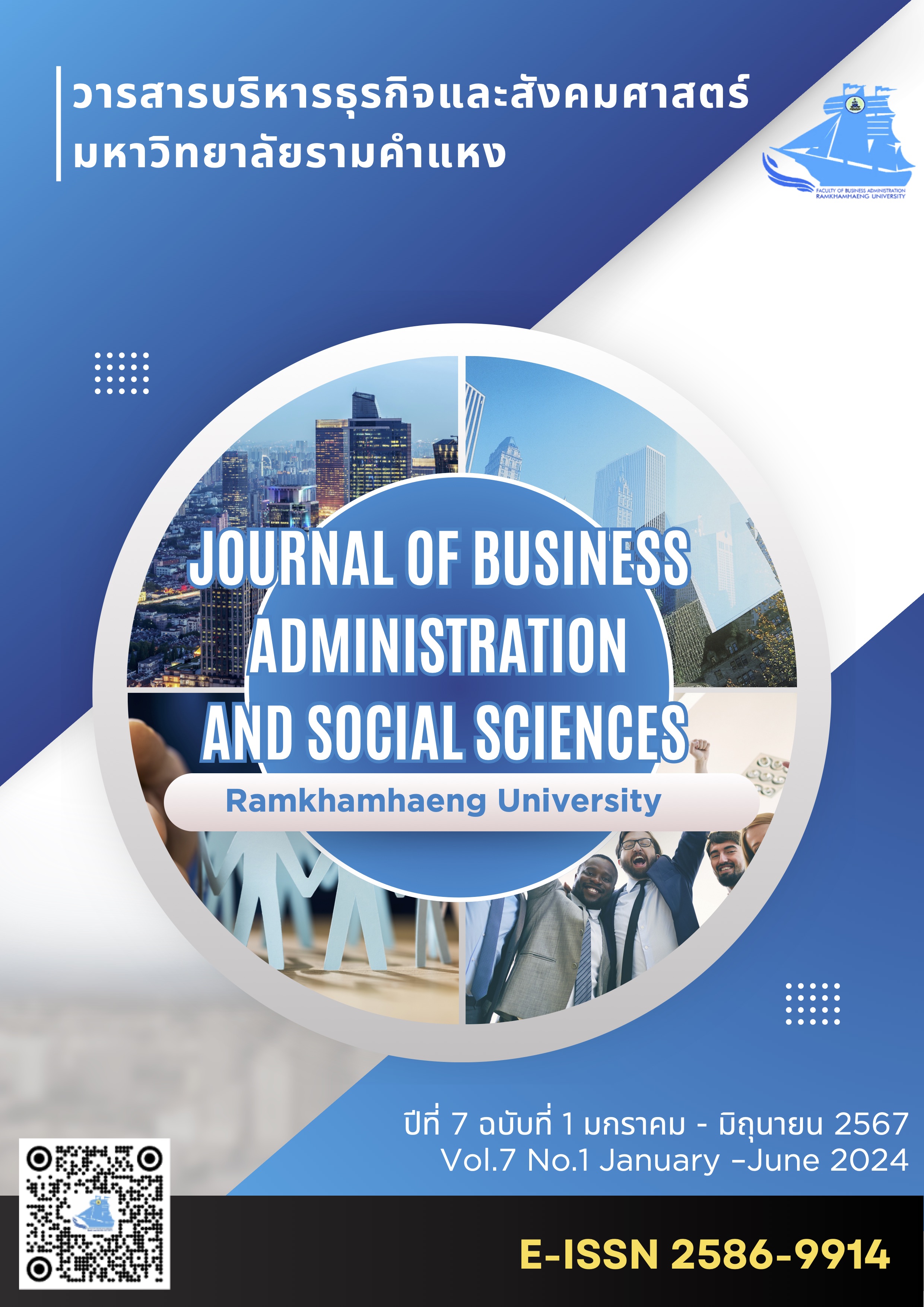Potential Development Of Community-Based Health Tourism For Sustainability: A Case Study Of Rai Sotsai Herbal Community, Khaen Subdistrict, Wapi Pathum District, Maha Sarakham Province
Main Article Content
Abstract
In this research investigation, the researchers examine 1) the situation and the management constraints for health tourism in Rai Sotsai Herbal Community, Khaen subdistrict, Wapi Pathum district, Maha Sarakham province; and propose and 2) guidelines for the potential development of the community-based health tourism in the community studied. The technique of qualitative research was conducted with participatory observation and semi-structured interview in order to discover the opinions regarding the potential of sustainable community-based health tourism: a case study of Rai Sotsai Herbal Community, Khaen Subdistrict, Wapi Pathum district, Maha Sarakham province. The sample population consisted of four groups: five from the public sector; five from the private sector; three from the people sector; and fifteen tourists who were volunteer tourists as the representatives of those traveling in the area.
Findings showed that overall, the health tourism in Maha Sarakham province should be supported substantially. Maha Sarakham is the Thai province prominent in herbs with herb cultivators. All sectors should help in the development and the support to ensure that Maha Sarakham stands out for its health tourism activities. Activities should respond to the tourists’ needs through herbs. With collaboration, constraints will decrease and this will benefit the area in the future. The researchers presented a model of tourism activities integrating the Five-Dimensional Good Health Perspective and the Destination Fascination Scale Model (DFS Model) in coordinating the five senses to use as community-based tourism activities in order to develop the potential of sustainable community-based health tourism.
Article Details

This work is licensed under a Creative Commons Attribution-NonCommercial-NoDerivatives 4.0 International License.
เนื้อหาและข้อมูลในบทความที่ลงตีพิมพ์ในวารสารบริหารธุรกิจและสังคมศาสตร์ มหาวิทยาลัยรามคำแหง ถือเป็นข้อคิดเห็นและความรับผิดชอบของผู้เขียนบทความโดยตรง ซึ่งกองบรรณาธิการไม่จำเป็นต้องเห็นด้วย หรือร่วมรับผิดชอบใดๆ
บทความ ข้อมูล เนื้อหา รูปภาพ ฯลฯ ที่ได้รับการตีพิมพ์ในวารสารบริหารธุรกิจและสังคมศาสตร์ มหาวิทยาลัยรามคำแหง ถือเป็นลิขสิทธิ์ของวารสารบริหารธุรกิจและสังคมศาสตร์ มหาวิทยาลัยรามคำแหง หากบุคคลหรือหน่วยงานใดต้องการนำบทความทั้งหมดหรือส่วนหนึ่งส่วนใดไปเผยแพร่ต่อ หรือเพื่อกระทำการใดๆ จะต้องได้รับอนุญาตเป็นลายลักษณ์อักษรจากวารสารบริหารธุรกิจและสังคมศาสตร์ มหาวิทยาลัยรามคำแหง ก่อนเท่านั้น
References
กรมการแพทย์แผนไทยและการแพทย์ทางเลือก. (2560). แนวทางการดำเนินงานโครงการพัฒนาเมือง
สมุนไพร (Herbal City). ในการประชุมเชิงปฏิบัติการ เรื่อง “แนวทางการดำเนินงานโครงการ
พัฒนาเมืองสมุนไพร (Herbal City). การประชุมสัมมนาจัดโดยกรมการแพทย์แผนไทยและ
การแพทย์ทางเลือก, โรงแรมรามาการ์เด้นส์.
กรมสนับสนุนบริการสุขภาพ. (2559). ยุทธศาสตร์การพัฒนาประเทศไทยให้เป็นศูนย์กลางสุขภาพนานาชาติ (MEDICAL HUB) (พ.ศ. 2560-2569). สืบค้นจาก https://hss.moph.go.th/
fileupload/2560-102.pdf
กรุงเทพธุรกิจ. (2563, 29 ธันวาคม). ตลาดสมุนไพร เศรษฐกิจหลักของไทย. สืบค้นจาก https://www.bangkokbiznews.com/news/detail/914569
ชาย โพธิสิตา. (2554). ศาสตร์และศิลป์แห่งการวิจัยเชิงคุณภาพ. กรุงเทพฯ: อมรินทร์พริ้นติ้ง.
ทวีศักดิ์ นพเกษร. (2549). วิธีการวิจัยเชิงคุณภาพ เล่ม 2. นครราชสีมา: โชคเจริญมาร์เก็ตติ้ง.
ธีระพงษ์ อาญาเมือง. (2563). การส่งเสริมสถานประกอบการสปาเพื่อสุขภาพ ในการเป็นศูนยก์ลางการ
ท่องเที่ยวเชิงสุขภาพ ในภาคตะวันออก. วิทยานิพนธ์ปรัชญาดุษฎีบัณฑิต, มหาวิทยาลัยบูรพา,
ชลบุรี.
ธง คำเกิด และวัชรพันธ์ แสนสิทธิ์. (2562). แนวทางการพัฒนาการท่องเที่ยวโดยชุมชนบ้านบางแม่หม้าย ตำบลบางใหญ่ อำเภอบางปลาม้า จังหวัดสุพรรณบุรี. วารสารศิลปศาสตร์ราชมงคลสุวรรณภูมิ, 1(3), 221-232.
นลินวิรุฬห์ คำมูลอามาตย์. (2559). ปัจจัยที่ส่งผลต่อประสบการณ์ของนักท่องเที่ยวชาวจีนในการใช้
บริการสปาในเมืองพัทยา. บริหารธุรกิจมหาบัณฑิต, มหาวิทยาลัยบูรพา, ชลบุรี.
พิชญาพร ศรีบุญเรือง และฉลองศรี พิมลสมพงศ์. (2564). การพัฒนาคุณค่าแหล่งท่องเที่ยวเพื่อรองรับ
นักท่องเที่ยวศักยภาพสูงในประเทศไทย. วารสารเทคโนโลยีภาคใต้, 14(1), 1-13.
พุทธชาติ ลุนคำ. (2564). ธุรกิจท่องเที่ยวและโรงแรมหลัง COVID-19. สืบค้น จาก https://www.krungsri
.com/th/research/research-intelligence/ri-future-of-tourism-21
เมษ์ธาวิน พลโยธี, สุธาธิณี หนูเนียม, และสุวิชาดา สกุลวานิชเจริญ. (2565). แนวทางการพัฒนาการท่องเที่ยวโดยชุมชนอย่างยั่งยืน กรณีศึกษา ชุมชนไทดำ บ้านนาป่าหนาด อำเภอเชียงคาน จังหวัดเลย. วารสารท่องเที่ยวไทยนานาชาติ, 18(1).
วัฒนศักดิ์ ศรรุ่ง, ธนพล ก่อฐานะ, และจิราพร สวัสดิรักษ์. (2565). รูปแบบนวัตกรรมการจัดการเพื่อเพิ่มประสิทธิผลของเมืองสมุนไพร (Herbal City) ภายใต้แผนแม่บทแห่งชาติ ว่าด้วยการพัฒนาสมุนไพรไทย. วารสารมนุษยศาสตร์และสังคมศาสตร์ มหาวิทยาลัยราชภัฎพิบูลสงคราม, 16(1), 351-364.
ศันสนีย์ กระจ่างโฉม, อาชว์บารมี มณีตระกูลทอง, และเผชิญวาส ศรีชัย. (2562). แนวทางการพัฒนากิจกรรมการท่องเที่ยวสำหรับนักท่องเที่ยวผู้สูงอายุชาวต่างชาติในพื้นที่อารยธรรมล้านนา. วารสารวิชาการ มหาวิทยาลัยหอการค้าไทย มนุษยศาสตร์และสังคมศาสตร์, 39(3), 75-90.
สรรค์นันธ์ ตันติอุโฆษกุล อัครวงศ์, เจริญพร เพ็ชรกิจ, รัฐศวรรธน์ กิ่งแก้ว, และพวงรัตน์ จินพล (2560) นครศรีธรรมราชให้เป็นศูนย์กลางการท่องเที่ยวเชิงสุขภาพของภาคใต้ตอนบน. กรุงเทพฯ: สำนักงานกองทุนสนับสนุนการวิจัย.
สำนักงานปลัดกระทรวงเกษตรและสหกรณ์. (2564). ร่างแม่บทแห่งชาติว่าด้วยการพัฒนาสมุนไพรไทย พ.ศ. 2565–2569 และกฎระเบียนที่เกี่ยวข้องกับยาสมุนไพรใหม่ ๆ. สืบค้นจาก https://www.opsmoac.go.th/sustainable_agri-knowledge-files-431291791813
สำนักงานสภาพัฒนาการเศรษฐกิจและสังคมแห่งชาติ (สศช.). (2564). แผนแม่บทเฉพาะกิจภายใต้ยุทธศาสตร์ชาติอันเป็นผลมาจากสถานการณ์โควิด-19 พ.ศ. 2564-2565. สืบค้นจาก http://nscr.nesdb.go.th
สุนทร โชคสวัสดิ์ธนะกิจ, รภัสสา จันทาศรี, สุจิตรา ผาระนัด, ประยงค์ ตันแล, และสุศงคาร จันทะสี. (2562). รายงานกิจกรรมส่งเสริมและสนับสนุนการวิจัยนาดูนโมเดลต้นแบบสมุนไพรในระบบเกษตรที่ดีและเหมาะสมสู่การขับเคลื่อนเมืองสมุนไพรของจังหวัดมหาสารคาม. กรุงเทพฯ: สำนักงานการวิจัยแห่งชาติ (วช.).
อภิวัฒน์ แสงวงศ์ วุธิพงศ์ ภักดีกุล, และวรินท์มาศ เกษทองมา. (2563) การพัฒนายุทธศาสตร์เมืองสมุนไพรสกลนคร. วารสารวิจัยและพัฒนาระบบสุขภาพ 13(1), 551-561.
อุทัยทิพย์ เจี่ยวิวรรธน์กุล. (2553). การวิจัยเชิงปฏิบัติการอย่างมีส่วนร่วม: แนวคิด หลักการ และบทเรียน. สืบค้นจาก https://repository.li.mahidol.ac.th/handle/123456789/28406.
Ashton, A. S. (2015). Developing a Tourist Destination Brand Value: The Stakeholders’ Perspective. Tourism Planning & Development, 12(1), 398-411.
Ashton, A. S. (2021). Wellness Tourism: Healing and Sustainable Practices. In Rebuilding Tourism for The Future Through Sustainable Development. Symposium conducted at the meeting of ICRTH, Online.
Denzin, N. K., & Lincoln, Y. S. (1994). Strategic of inquiry: Handbook of qualitative research. Thousand Oaks, CA: Sage.
Dillette, A. K., Douglas, A. C., & Andrzejewski, C. (2020). Dimensions of holistic wellness as a result of international wellness tourism experiences. Current Issues in Tourism, 24(6), 794-810.
Liu., C. R., Wang, Y. C., Huang, W. S., & Chen, S. P. (2017). Destination fascination: Conceptualization and scale development. Tourism Management, 63(1), 255-267.
Taskin, C., Karadamar, A. A., & Ozturk, O. (2018). Investigating the influence of destination fascination on destination brand loyalty for tourism development. In Second International Scientific Conference on Economics and Management - EMAN 2018.
World Health Organization. (1998). Resolutions and decisions of regional interest adopted by the fifty-first World Health Assembly and by the Executive Board at its 101st and 102nd sessions. Retrieved from https://apps.who.int/iris/bitstream/handle/10665/121690/em_rc45_4_b_en.pdf.


